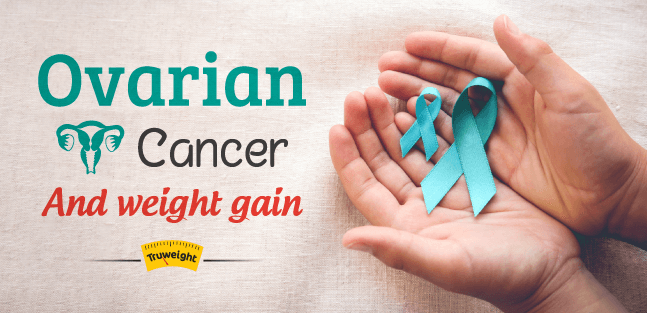Disease, Health, Weight Loss
Ovarian Cancer and Weight Gain, What Should You Do About It?
Ovarian cancer is one of the deadliest cancers afflicting women and is described as a silent killer because the symptoms are deceptive enough to be overlooked.
Early detection is difficult and rare; only 20% of the cases fall under this category for doctors to manage the disease successfully.
Ovarian cancer to this date remains the fifth most fatal type of cancer amongst women.
Table of Contents:
- What is ovarian cancer?
- Symptoms of ovarian cancer
- Ovarian cancer causes
- Types of ovarian Cancer
- Ovarian cancer stages
- Treatment of ovarian cancer
- Weight gain and ovarian cancer
- Combating weight gain due to ovarian cancer
What is ovarian cancer?
Ovarian cancer is caused when cells in the ovary and the far end of the fallopian tube grow uncontrollably and spread to other parts of the body before it is detected.
Symptoms of ovarian cancer:
Ovarian cancer symptoms creep up on you very subtly. The signs are difficult to distinguish from those of other conditions.
This is the major reason for failure to detect ovarian cancer in the early stages and can be easily mistaken for other medical conditions.
Yet, the signs of ovarian cancer are ominous and should be taken seriously to rule out its incidence and or facilitate early detection. The symptoms felt by the women include:
- Frequent indigestion, bloating and nausea.
- Sudden alteration of appetite pattern.
- Feeling of pressure on the pelvis and lower back.
- Frequent urge to urinate.
- Constipation.
- Increase in abdominal girth.
- Signs of exhaustion and low energy levels.
- Irregular menstrual cycles.
As the tumors grow in size, there is a progressive worsening of the symptoms. The tumors tend to occupy greater space in the abdomen and exert pressure on other organs interfering in their normal body functions.

Ovarian cancer causes:
There is no clarity as yet on the causes of the incidence of most ovarian cancers.
However, recent findings suggest that cancer originates in the cells at the ends of the fallopian tubes rather than in the ovary itself.
This new revelation has given rise to some new theories related to the causes of ovarian cancer and the risk factors involved in its onset.
Ovulation: Pregnancy and intake of birth control pills reduce the release of the number of eggs from the ovaries lowering the risk of ovarian cancer.
Surgery: Tubal ligation and hysterectomy are known to lower the risk of ovarian cancer as cancer-causing substances are denied access to vulnerable spots.
Hormone: Male hormones like androgen are suspected to cause ovarian cancer.
Types of Ovarian Cancer:
Though ovarian cancers have been classified into more than 30 different types based on the cells of origin, the ovarian tumors are known to be most commonly of three cell types:
- Epithelium: covering cells of the outer lining of the ovaries.
- Germ cells: cells that eventually form eggs.
- Stromal cells: cells that connect different structures of the ovaries and release hormones.
Ovarian cancer stages:
The stage of the ovarian cancer is determined during surgery after confirmatory diagnosis. Depending on its spread, ovarian cancer has been categorized into four stages:
- Stage I: Cancer is confined to the ovary or the fallopian tube.
- Stage II: Involvement of cancer growth in one or both the ovaries with pelvic extension.
- Stage III: Involvement of cancer growth in one or both the ovaries with spread beyond the pelvis.
- Stage IV: The spread of cancer growth is throughout the body.
Treatment of ovarian cancer:
The manifestation of symptoms like unexplained weight gain, digestive discomfort accompanied by abdominal pain, urinary or sexual distress necessitates surgical intervention. The course of treatment is determined by the following factors:
- The stage of ovarian cancer
- The type and size of the tumor
- Whether future pregnancy is planned.
Once the course is finalized, the treatment approaches, usually recommended by the doctors, are local and systemic treatments.
Local Treatment:
Surgery and radiotherapy are the two main types of local treatment where the tumor is targeted at specific sites without affecting the other parts of the body.
The scale of surgery depends on the stage of cancer. Radiotherapy uses X-rays or other forms of energy to kill cancer cells.
Systemic Treatment:
The use of oral or intravenous drugs through chemotherapy, hormone therapy, and targeted therapy falls within the purview of this treatment. Sometimes chemotherapy is used before surgery to shrink the size of the tumor.
Weight gain and ovarian cancer:
These two, Weight gain in people with ovarian cancer is usually induced by physically living with the disease and treatment-related reasons.
Chemotherapy and hormone therapy may cause patients to gain weight. However, the common causes that link ovarian cancer to weight gain are:
- Ovarian cancer symptoms are hard to manifest. By then the deep-seated tumor would have grown large.
- As the tumors grow, fluid accumulation may occur in the abdomen.
- Certain cancer drugs retain excess water in the body.
- People with ovarian cancer tend to overeat and exercise less.
- Constipation is another reason.
Combating weight gain due to ovarian cancer:
As of yet, it isn’t clear what relation weight gain has with ovarian cancer.
However, it certainly increases the risk factors, which can be reduced by leading an active lifestyle and maintaining a healthy weight.
Some other steps that may be adopted to manage weight gain are:

- Get used to a low-calorie diet.
- Limit your consumption of salt in food to deter water retention.
- Avoid high sugar foods.
- Prepare your food with low-fat techniques such as grilling and steaming.
- Eat your food in small portions.
- Avoid red meat and confine yourself to poultry and fish.
- Consume a lot of legumes like beans, grains, and peas.
- Try to avoid refined grains.
- Eat greens, vegetables, and whole fruits.
- Avoid fats such as butter.
- Exercise regularly especially walking.
- Indulge in activities that relieve stress like meditation and yoga.
Bottom Line:
[bs-quote quote=”It is ironic that symptoms of ovarian cancer are detected in the early stage in only 20% of the cases, when it is the most treatable.Women must see a doctor when the first signs of symptoms similar to those of ovarian cancer appear and when there is no other apparent cause for said symptoms. Women who have close relatives with ovarian cancer are more vulnerable to ovarian cancer and only timely professional medical help can increase the chances of survival.” style=”style-6″ align=”center”][/bs-quote]

Hi this is an amazing article,
Hi Collins! Thank you again, this article explains you how to come over the overian cancer. Keep following our blog to know more health information.
Really motivated content and make me have tears in my eyes. All my dreams became true and I forgot about myself when I was fat. I wanted to share with you the blog because it did change my life of thinking. It also has some science-based diet and some pieces of information that nobody nowadays knows about
Hi Malih! We thank you for sharing your feedback towards our article. This article explains you how to come over ovarian cancel. Keep following our blog to know more health information.